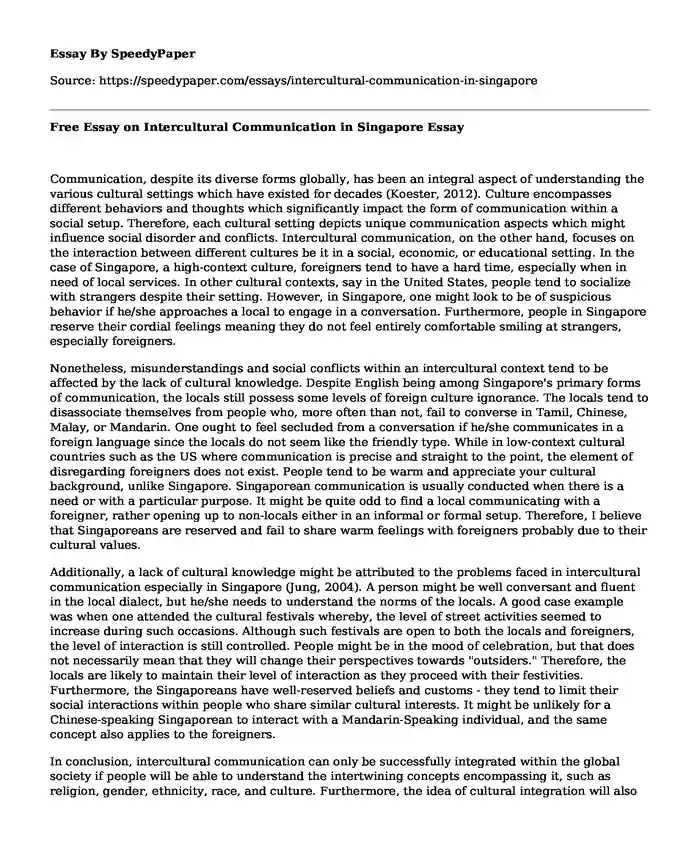
| Type of paper: | Essay |
| Categories: | Multiculturalism Asia Human behavior Intercultural communication |
| Pages: | 3 |
| Wordcount: | 670 words |
Communication, despite its diverse forms globally, has been an integral aspect of understanding the various cultural settings which have existed for decades (Koester, 2012). Culture encompasses different behaviors and thoughts which significantly impact the form of communication within a social setup. Therefore, each cultural setting depicts unique communication aspects which might influence social disorder and conflicts. Intercultural communication, on the other hand, focuses on the interaction between different cultures be it in a social, economic, or educational setting. In the case of Singapore, a high-context culture, foreigners tend to have a hard time, especially when in need of local services. In other cultural contexts, say in the United States, people tend to socialize with strangers despite their setting. However, in Singapore, one might look to be of suspicious behavior if he/she approaches a local to engage in a conversation. Furthermore, people in Singapore reserve their cordial feelings meaning they do not feel entirely comfortable smiling at strangers, especially foreigners.
Nonetheless, misunderstandings and social conflicts within an intercultural context tend to be affected by the lack of cultural knowledge. Despite English being among Singapore's primary forms of communication, the locals still possess some levels of foreign culture ignorance. The locals tend to disassociate themselves from people who, more often than not, fail to converse in Tamil, Chinese, Malay, or Mandarin. One ought to feel secluded from a conversation if he/she communicates in a foreign language since the locals do not seem like the friendly type. While in low-context cultural countries such as the US where communication is precise and straight to the point, the element of disregarding foreigners does not exist. People tend to be warm and appreciate your cultural background, unlike Singapore. Singaporean communication is usually conducted when there is a need or with a particular purpose. It might be quite odd to find a local communicating with a foreigner, rather opening up to non-locals either in an informal or formal setup. Therefore, I believe that Singaporeans are reserved and fail to share warm feelings with foreigners probably due to their cultural values.
Additionally, a lack of cultural knowledge might be attributed to the problems faced in intercultural communication especially in Singapore (Jung, 2004). A person might be well conversant and fluent in the local dialect, but he/she needs to understand the norms of the locals. A good case example was when one attended the cultural festivals whereby, the level of street activities seemed to increase during such occasions. Although such festivals are open to both the locals and foreigners, the level of interaction is still controlled. People might be in the mood of celebration, but that does not necessarily mean that they will change their perspectives towards "outsiders." Therefore, the locals are likely to maintain their level of interaction as they proceed with their festivities. Furthermore, the Singaporeans have well-reserved beliefs and customs - they tend to limit their social interactions within people who share similar cultural interests. It might be unlikely for a Chinese-speaking Singaporean to interact with a Mandarin-Speaking individual, and the same concept also applies to the foreigners.
In conclusion, intercultural communication can only be successfully integrated within the global society if people will be able to understand the intertwining concepts encompassing it, such as religion, gender, ethnicity, race, and culture. Furthermore, the idea of cultural integration will also play a fundamental role in improving the adoption of different cultures within society.
References
Jung, E., & Hecht, M. L. (2004). Elaborating the communication theory of identity: Identity gaps and communication outcomes. Communication Quarterly, 52(3), 265-283. Retrieved from: https://scholar.google.com/scholar?hl=en&as_sdt=0%2C5&q=Jung%2C+E.%2C+%26+Hecht%2C+M.+L.+%282004%29.+Elaborating+the+communication+theory+of+identity%3A+Identity+gaps+%09and+communication+outcomes&btnG=
Koester, J., & Lustig, M. (2012). Intercultural competence: Interpersonal communication across cultures. Pearson Prentice Hall. Retrieved from: https://scholar.google.com/scholar?hl=en&as_sdt=0%2C5&q=Koester%2C+J.%2C+%26+Lustig%2C+M.+%282012%29.+Intercultural+competence%3A+Interpersonal+communication+across+%09cultures.+&btnG=
Cite this page
Free Essay on Intercultural Communication in Singapore. (2023, Jan 12). Retrieved from https://speedypaper.com/essays/intercultural-communication-in-singapore
Request Removal
If you are the original author of this essay and no longer wish to have it published on the SpeedyPaper website, please click below to request its removal:
- The Intelligence Cycle - Free Essay for Students
- Ethical Emotivism, Free Essay for Everyone
- Free Essay Example on Gender and Feminist Theory
- The History of Androscoggin Mill and Environmental Issues in Our Free Essay
- Essay Example on Why Abortion Should Be Legal
- Movie Review Essay Sample: Cultural Interpretation of the Thai Culture in The Hangover Part 2
- Nursing Essay Example: Home Visit with Sallie Mae Fisher
Popular categories




